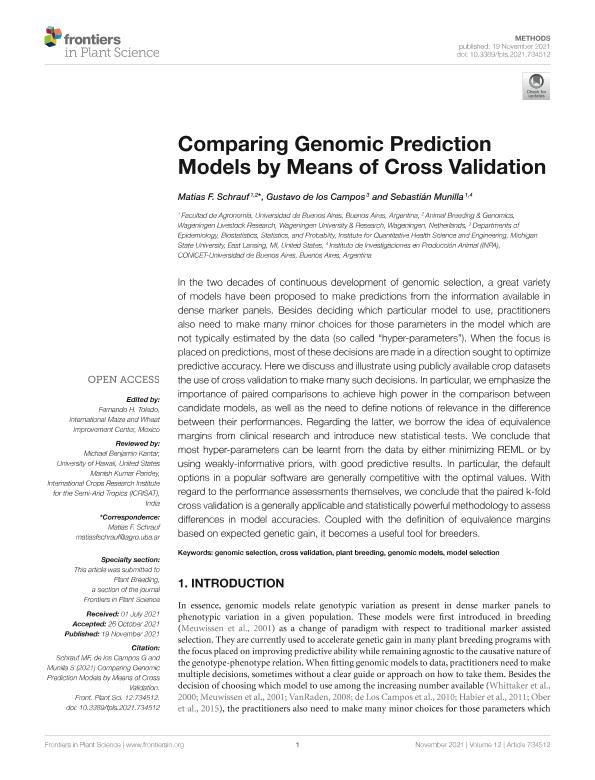Mostrar el registro sencillo del ítem
dc.contributor.author
Schrauf, Matías Florián

dc.contributor.author
de los Campos, Gustavo
dc.contributor.author
Munilla Leguizamon, Sebastian

dc.date.available
2023-09-15T19:41:55Z
dc.date.issued
2021-11
dc.identifier.citation
Schrauf, Matías Florián; de los Campos, Gustavo; Munilla Leguizamon, Sebastian; Comparing Genomic Prediction Models by Means of Cross Validation; Frontiers Media; Frontiers in Plant Science; 12; 734512; 11-2021; 1-11
dc.identifier.uri
http://hdl.handle.net/11336/211734
dc.description.abstract
In the two decades of continuous development of genomic selection, a great variety of models have been proposed to make predictions from the information available in dense marker panels. Besides deciding which particular model to use, practitioners also need to make many minor choices for those parameters in the model which are not typically estimated by the data (so called “hyper-parameters”). When the focus is placed on predictions, most of these decisions are made in a direction sought to optimize predictive accuracy. Here we discuss and illustrate using publicly available crop datasets the use of cross validation to make many such decisions. In particular, we emphasize the importance of paired comparisons to achieve high power in the comparison between candidate models, as well as the need to define notions of relevance in the difference between their performances. Regarding the latter, we borrow the idea of equivalence margins from clinical research and introduce new statistical tests. We conclude that most hyper-parameters can be learnt from the data by either minimizing REML or by using weakly-informative priors, with good predictive results. In particular, the default options in a popular software are generally competitive with the optimal values. With regard to the performance assessments themselves, we conclude that the paired k-fold cross validation is a generally applicable and statistically powerful methodology to assess differences in model accuracies. Coupled with the definition of equivalence margins based on expected genetic gain, it becomes a useful tool for breeders.
dc.format
application/pdf
dc.language.iso
eng
dc.publisher
Frontiers Media

dc.rights
info:eu-repo/semantics/openAccess
dc.rights.uri
https://creativecommons.org/licenses/by/2.5/ar/
dc.subject
CROSS VALIDATION
dc.subject
GENOMIC MODELS
dc.subject
GENOMIC SELECTION
dc.subject
MODEL SELECTION
dc.subject
PLANT BREEDING
dc.subject.classification
Agronomía, reproducción y protección de plantas

dc.subject.classification
Agricultura, Silvicultura y Pesca

dc.subject.classification
CIENCIAS AGRÍCOLAS

dc.title
Comparing Genomic Prediction Models by Means of Cross Validation
dc.type
info:eu-repo/semantics/article
dc.type
info:ar-repo/semantics/artículo
dc.type
info:eu-repo/semantics/publishedVersion
dc.date.updated
2023-09-14T17:34:51Z
dc.identifier.eissn
1664-462X
dc.journal.volume
12
dc.journal.number
734512
dc.journal.pagination
1-11
dc.journal.pais
Suiza

dc.journal.ciudad
Lausana
dc.description.fil
Fil: Schrauf, Matías Florián. University of Agriculture Wageningen; Países Bajos. Universidad de Buenos Aires. Facultad de Agronomía; Argentina. Consejo Nacional de Investigaciones Científicas y Técnicas. Oficina de Coordinación Administrativa Parque Centenario. Unidad Ejecutora de Investigaciones en Producción Animal. Universidad de Buenos Aires. Facultad de Ciencias Veterinarias. Unidad Ejecutora de Investigaciones en Producción Animal; Argentina
dc.description.fil
Fil: de los Campos, Gustavo. Michigan State University; Estados Unidos
dc.description.fil
Fil: Munilla Leguizamon, Sebastian. Consejo Nacional de Investigaciones Científicas y Técnicas. Oficina de Coordinación Administrativa Parque Centenario. Unidad Ejecutora de Investigaciones en Producción Animal. Universidad de Buenos Aires. Facultad de Ciencias Veterinarias. Unidad Ejecutora de Investigaciones en Producción Animal; Argentina. Universidad de Buenos Aires. Facultad de Agronomía; Argentina
dc.journal.title
Frontiers in Plant Science
dc.relation.alternativeid
info:eu-repo/semantics/altIdentifier/url/https://www.frontiersin.org/articles/10.3389/fpls.2021.734512/full
dc.relation.alternativeid
info:eu-repo/semantics/altIdentifier/doi/http://dx.doi.org/10.3389/fpls.2021.734512
Archivos asociados
